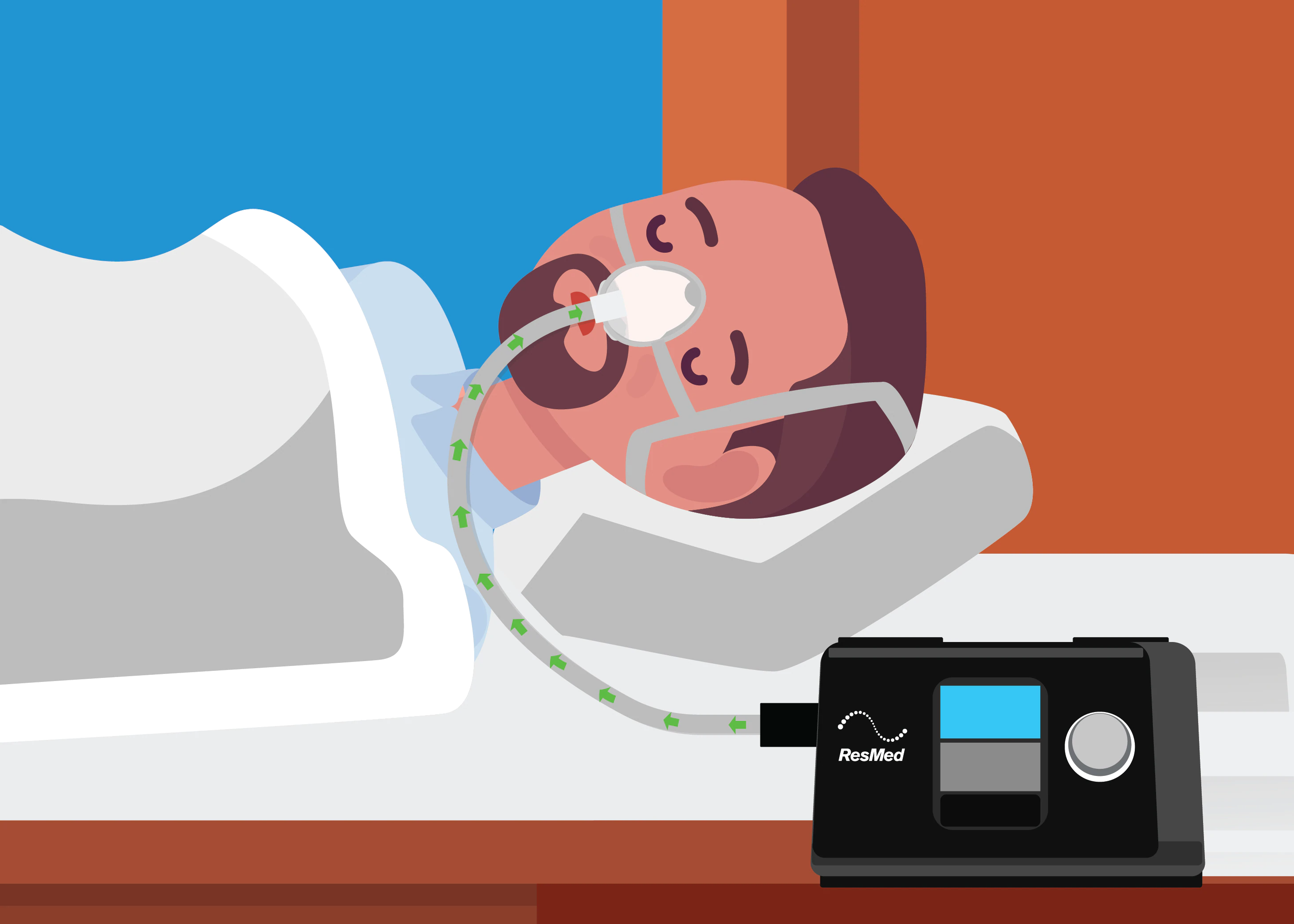CPAP Pressure Settings- ResMed
Obstructive sleep apnea (OSA) is one of the most common sleep disorders in India, with over 36 million people suffering from it, in both urban and rural areas. Patients with obstructive sleep apnea experience difficulty in breathing normally throughout the night as the muscles in their upper airway over-relax, obstructing the flow of air into the body. Their body wakes up multiple times, to clear the airway and restore breathing, leading to disrupted and incomplete sleep.
CPAP Treatment
Fortunately, obstructive sleep apnea can be treated and the best method is using a continuous positive airway pressure (CPAP) device. A CPAP device ensures that the flow of air is maintained at a steady pressure, to keep the upper airway unobstructed throughout the night. Since patients can breathe without any disruption, they are able to get a restful sleep.
That said, every patient has a unique air pressure requirement to be able to breathe comfortably. Sleep technicians and CPAP therapists usually indicate the optimum air pressure that the CPAP machine should be calibrated to according to individual patient needs. If pressure levels are too high or too low, it will defeat the purpose of the therapy.
CPAP Pressure Settings
Symptoms your CPAP Pressure is too high
When the CPAP air pressure is high, you may feel uncomfortable during sleep - either dins it difficult to fall asleep or wake up repeatedly during the night. At times, a very high air pressure may cause you to swallow the air, or aerophagia. In such instances, you may experience severe belching, bloating stomach, and abdominal discomfort. Some patients may also experience a burning sensation in their noses/throats or fluid leakage from the ears that may cause hearing disorders.
.png?width=600&name=cpap-pressure%20(1).png)
Symptoms your CPAP Pressure is too low
On the other hand when the CPAP pressure is too low, you may face problems breathing as the air pressure may not be adequate to keep the upper airway properly opened. Low air pressure may cause patients to experience more than five apnea or hypopnea events every hour, not really solving the sleep apnea problem. Patients may continue to experience the discomfort of repeated gasping for air, fatigue, high blood pressure, and snoring due to low CPAP pressure, rendering the therapy ineffective.
For most patients, the CPAP air pressure setting is generally between 6 cm H2O to 14 cm H2O. Still, it is important to check with your sleep specialist to determine the most appropriate air pressure level for your individual requirement.
How to adjust CPAP Pressure?
Adjusting the pressure on a CPAP machine should be done cautiously and typically under professional guidance to ensure optimal treatment of Sleep apnea. Here's a simplified guide:
1. Consult Your Doctor: Before adjusting the pressure, speak with your healthcare provider. They can advise on the necessary changes based on your symptoms or a sleep study.
2. Access the Settings: Most CPAP machines have a menu for settings. You might need to press and hold specific buttons to enter adjustment mode.
3. Adjust the Pressure: Use the machine's interface to change the pressure setting. Your doctor will recommend the ideal pressure level.
4. Test the New Setting: Use the CPAP machine with the new setting for a few nights to see if your sleep improves.
5. Follow-Up: Report any changes to your doctor, especially if you experience discomfort or no improvement.
Remember, professional input is crucial to safely and effectively adjust your CPAP machine's pressure.
Calibrate for Optimum CPAP Pressure
Once a CPAP device is purchased, it must be adjusted for the right level of air pressure for an individual. Sleep specialists use the apnea-hypopnea index (AHI) to determine the required CPAP pressure level. The AHI is a measure of the number of times a patient experiences disturbance in breathing during an hour's sleep.
Air pressure calibration on CPAP machines is done through a process called titration. So you are advised against trying to adjust the air pressure of a CPAP machine on your own. Also, never get the air pressure adjusted without a medical prescription. If you feel the air pressure needs adjustment, discuss with your sleep specialist and seek expert help to get the adjustments done.
For fixed pressure CPAP machines, the air pressure is maintained at the minimum level required to keep the airways open throughout the night. For auto-titrating pressure machines, both minimum and maximum pressure levels must be set. However, air pressure requirements change with time, health conditions and age of the CPAP device.
Automatic Adjustments of CPAP Pressure Settings
To avoid the hassle of visiting a healthcare provider every time your air pressure requirement changes, you may consider an AutoPAP or APAP device. With automatic PAP machines, you don't need to worry about adjusting air pressure as these devices detect the breathing level and adjust the required air pressure automatically. For instance, it maintains a certain level of air pressure when a patient is about to fall asleep and increases the pressure only when an apnea event occurs. Once the event is over, it restores the air pressure back to normal levels to facilitate proper breathing.
You should speak to your medical practitioner or sleep specialist to determine what suits you best in the whole APAP vs. CPAP debate.
The right air pressure level is critical for the success of your CPAP therapy and ensuring you get a restful sleep without any disruptions. If you have been diagnosed with sleep apnea and are considering CPAP therapy, you can take the 15-day CPAP trial before buying your device. The trial gives you a chance to evaluate how CPAP fits into your lifestyle, and identify the right air pressure level that allows you to sleep comfortably.
Book your 15-day CPAP trial today.
If this article captured your interest, you'll definitely enjoy our follow-up piece: How to clean CPAP Machine, APAP vs CPAP, Manage Diabetes using CPAP Therapy, and Disposable vs Non Disposable CPAP Filter
